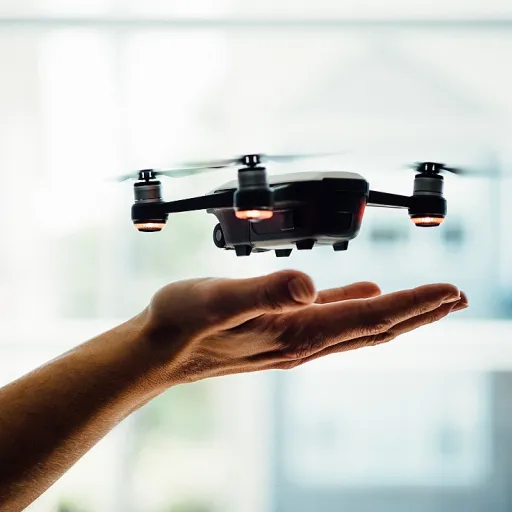
The Rise of AI in Indian Smart Homes
Revolutionizing Indian Smart Homes: A Boom in AI Adoption
The landscape of smart homes in India is undergoing a dynamic transformation, driven by the rise of artificial intelligence. As technology continues to evolve, the integration of AI-powered systems in residential spaces is paving the way for transformative experiences that cater to energy efficiency, security, and unmatched convenience. Recent market trends indicate a significant uptake in smart technology across Indian homes. This adoption wave is not just about high-tech gadgets but also about the seamless fusion of luxury and innovation. Smart devices and IoT platforms are becoming more widespread, reflecting a global shift towards smarter living environments. In India, the growth of AI-driven home solutions is largely attributed to the increasing demands of tech-savvy consumers who crave real-time interactions and personalized solutions. Energy-efficient systems, enhanced security frameworks, and digital interface products are making Indian homes a part of the future-focused global network. Furthermore, the burgeoning real estate sector is capitalizing on this trend by incorporating advanced AI-driven platforms in new developments, hence opening possibilities for even more integrated and smart living spaces. For those interested in exploring this intersection of luxurious living and cutting-edge technology, the elegance of the 4moms high chair offers a perfect example of how AI technology is innovatively enhancing everyday experiences.Luxury Meets Technology: AI Innovations
The Intersection of Opulence and Advanced Tech
In the rapidly evolving realm of Indian smart homes, luxury finds a harmonious blend with cutting-edge technology through the integration of artificial intelligence (AI). As Indian homes begin adopting more sophisticated smart devices, AI innovations are opening possibilities for creating intuitive living environments. These advancements are not merely confined to convenience but extend to enhance the overall opulence of contemporary real estate. Luxury tech gadgets, pivotal in India's digital transformation, are characterized by enhanced energy management and advanced security systems that offer homeowners peace of mind while adhering to the latest market trends. AI-driven devices boast increased energy efficiency, benefiting not only the environment but also providing cost savings to consumers. This efficiency is becoming a key allure for those seeking sustainable solutions without sacrificing elegance. In terms of personalization, smart platforms powered by AI are capable of learning from the users' habits, enabling real-time adjustments in lighting, temperature, and entertainment systems, thus catering to the unique preferences of each household. The capability to customize experiences transforms homes into not just places of residence, but exquisitely personalized sanctuaries. The global appeal of Indian luxury smart homes is further bolstered by the rise in demand for IoT-enabled products. These tech-enabled solutions are seamlessly assimilated into homes, granting homeowners complete control at their fingertips. Utilizing AI in such systems enhances usability, marking a new era where luxury meets innovation. For those intrigued by the latest in luxury tech, explore the elegance of LED diffusers that contribute to this sophisticated living experience. It's evident that the amalgamation of luxury and technology is a testament to how Indian consumers are not just embracing but leading the charge in AI-powered smart home adoption. The synergy of state-of-the-art tech and opulent living is undeniably part of a broader movement towards creating futuristic, yet cozy homes using advanced systems.Challenges and Opportunities in the Indian Market
Opportunities and Hurdles in India's Growing Market
The Indian market for smart homes has seen remarkable growth, driven by the innovative blending of luxury and cutting-edge technology. With AI-powered systems becoming integral to the modern Indian home experience, there lies a vast potential for the development and adoption of advanced smart devices. Yet, alongside these opportunities, significant challenges remain. Firstly, the economic disparity across regions in India creates a diverse market landscape. While urban areas show a heightened interest in luxury and AI-driven technology, rural locales may lag in tech adoption due to economic constraints and limited digital infrastructure. Hence, market players in the luxury tech domain must navigate these varied demographics strategically. Secondly, the shift towards energy-efficient systems is notable. Smart technology and IoT devices are designed to enhance energy conservation in Indian homes. These advancements align with global sustainability trends, appealing to environmentally conscious consumers. Nevertheless, the cost of these technologies can be prohibitive, posing a barrier to widespread adoption. Security and privacy concerns are another challenge overshadowing the smart home market in India. With increased integration of AI and IoT, protecting sensitive data from potential breaches becomes imperative. Consumers seek assurance that their data is secure, urging companies to prioritize robust security systems. Further opportunities abound with the rise in digital real estate platforms, making it easier for consumers to discover smart homes offering luxury features. Platforms that integrate real-time AI analytics to tailor recommendations for homebuyers could revolutionize the market dynamics in India, opening new possibilities for targeted marketing. Lastly, as the market continues to mature, there's potential for more customization in AI-driven home products, accommodating the unique preferences of Indian consumers. By focusing on these targeted opportunities while addressing the prevalent challenges, the luxury smart home market in India can achieve further growth.Discover more about how AI is enhancing the ecosystem of luxury gadgets, offering Indian homes a futuristic allure, at the allure of AI-enhanced luxury gadgets.
AI-Driven Home Automation Systems
Innovative Automation Enhancing Lifestyle
The surge in AI-powered automation systems is revolutionizing the concept of smart homes in India. These advanced systems are meticulously designed to provide unparalleled convenience and efficiency, transforming daily routines into seamless experiences. As technology evolves, these smart systems integrate more intricately with traditional home setups, enhancing the living standard in a profoundly impactful way. Smart homes in India are increasingly adopting AI-driven technology products that offer real-time solutions to previously mundane tasks. By integrating IoT and machine learning, these systems effectively manage and control various household functions, from regulating energy consumption to provide customized lighting solutions. Such energy-efficient platforms not only reduce utility bills but also contribute to a sustainable environment, appealing to Indian consumers who are becoming more eco-conscious. Moreover, the blend of luxury and technology is evident in the diverse range of AI-driven devices and platforms available in the market. From smart thermostats to voice-assisted security systems that ensure homes stay secure, the market is inundated with products designed to cater to the burgeoning demand for luxury tech solutions. These smart systems are equipped with features that can learn user habits over time, bringing a level of personalization that was previously unimaginable. The drive towards digital growth in the Indian real estate and tech market is apparent, with a noticeable shift towards AI-powered systems in new developments. As more construction projects embrace this cutting-edge technology, the adoption rate in Indian homes is likely to accelerate, opening possibilities for further innovations in smart living solutions. Thus, the evolution of AI-driven home automation in India heralds an exciting era. As more households start using these systems, the amalgamation of luxury and technology will not only redefine modern living but will also heighten the allure of smart homes, both in India and globally.Security and Privacy Concerns
Ensuring Digital Safety in the Age of AI
The integration of smart devices into Indian homes has opened a realm of possibilities, allowing families to enjoy the benefits of AI-powered technology, from real time energy management to seamless automation. However, this rapid growth has also brought significant challenges in maintaining security and privacy within these interconnected digital ecosystems.
Smart technology and IoT platforms are inherently vulnerable to potential cyber threats, given their reliance on internet connectivity and cloud-based systems. As Indian households transition towards smarter living, the necessity for robust security systems becomes paramount to protect personal data and digital assets.
The adoption of globally recognized security standards and protocols is crucial in securing these tech products. For example, encryption and secure authentication practices play a vital role in safeguarding information transmitted between devices and systems, thus minimizing potential breaches and unauthorized access.
Moreover, promoting awareness among Indian consumers about the importance of digital safety is equally imperative. Users must be informed about the risks associated with smart devices and adopt best practices such as regular software updates, secure Wi-Fi networks, and strong, unique passwords to enhance their security posture.
Addressing privacy concerns is another critical aspect as these AI-driven products extensively collect and analyze personal data to deliver personalized user experiences. Developing transparent privacy policies and giving users control over their data can significantly enhance trust and drive home adoption in the growing market.
As the market trends continue to evolve, the real estate industry and tech companies in India will need to collaborate closely, focusing on innovation and security to foster an environment where AI technology enriches lives without compromising on safety and privacy.













